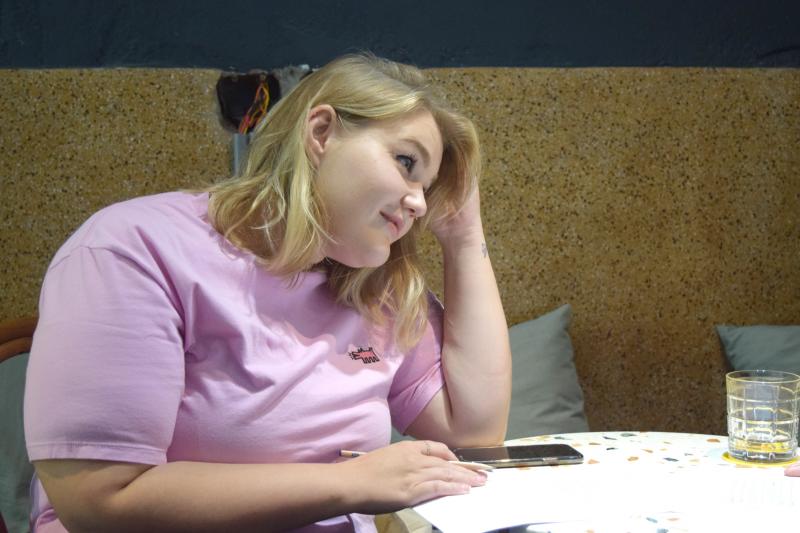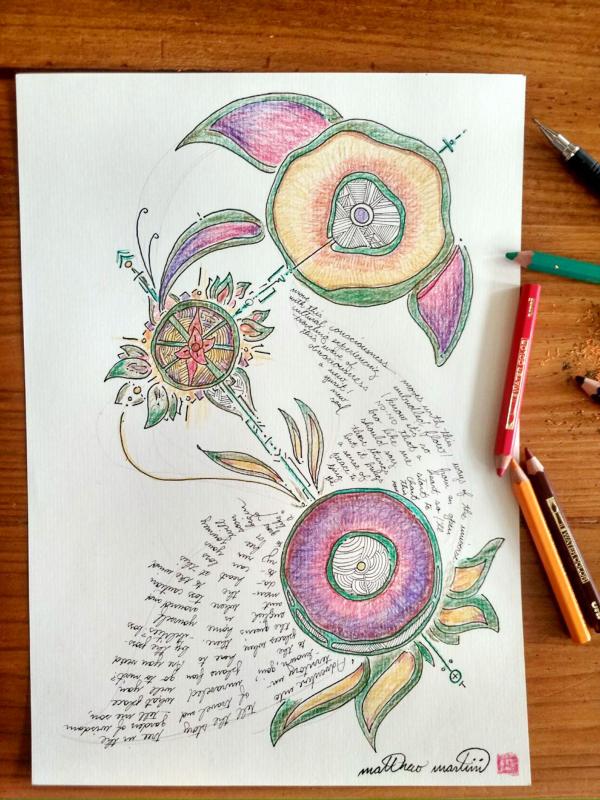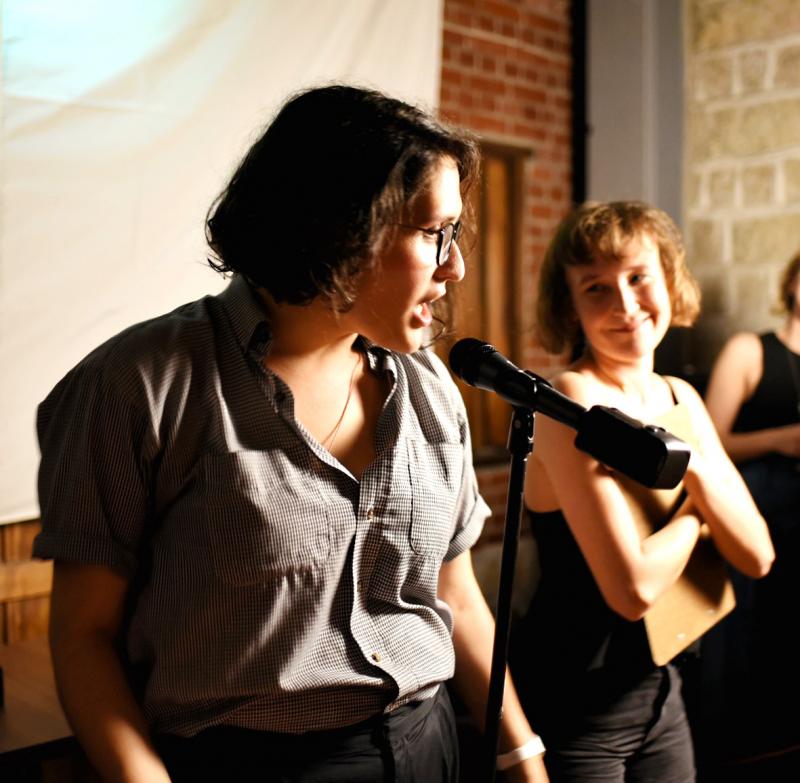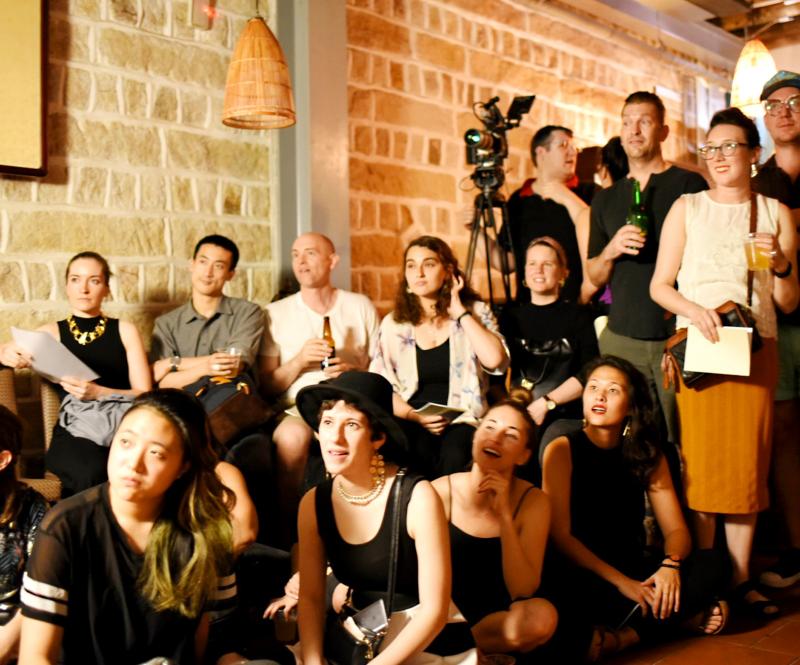One poet wrote about a stroll around a Taitung park. Another reminisced about her hometown in rural South Africa. And a third looked back on a love affair of long ago.
These were some of the poems shared over morning coffee by members of the Taichung Poetry Collective one recent weekend. The group of budding and seasoned poets gathers routinely to critique each other’s work.
And while the talk was of metaphors and rhyming couplets, looming in the back of these poets’ minds was the COVID-19 crisis that has left much of the world reeling in lockdowns, unemployment and death.

Photo courtesy of John Evans
“I should write because of it, but I can’t,” said the poetry group’s co-founder, Michelle Strydom, whose writing has admittedly become deeper and darker. “I feel guilty for being able to drive to work.”
Drawing from the feeling of entrapment, her poem Dreams of Dying Birds details the perils of the world outside the nation’s relative safety. Here is an excerpt:
These dreams I remember

Photo courtesy of Matt Martini
The birds always die
Bloody feathers scattered
carried away by wind’s tide

Photo courtesy of Abby Chao
The Taichung group, which hopes to publish a collection of poetry in the near future, has held workshops while maintaining social distance. First they tried poetry in the park with members spaced out. Then virtual poetry workshops, which proved to be awkward. Computer lag time created a stuttered flow to the conversation, losing the feeling of the poem, Strydom said.
Yet poets need an outlet, members said, with anxiety either paralyzing the creative process or driving writers to become more prolific.
“Meaningful memories need to come out,” said Matt Martini, a member of the Taichung poets’ group. “There’s pressure of sorts, but at the same time you can’t write on demand.”

Photo courtesy of Abby Chao
For inspiration, Martini has recently turned to American poet and musician, Saul Williams, whose work has spanned from the slam poetry movement of the 1990s to recent political issues like Black Lives Matter.
Events that happened years ago are still relevant, said Martini. For instance, in parts of the world, the impact of the coronavirus has disproportionately affected minority communities, with higher rates of illness and mortality.
“It reminds me that even though we’re in Taiwan we’re not out of it yet,” Martini said.
How poets respond to turbulent times is not unique to this current health crisis. From Walt Whitman to Emily Dickinson, writers have seen the world through a unique poetic lens.
“With all the anxiety around, [Dickinson] would have understood this period,” said Mary Goodwin, a professor of American literature at National Taiwan Normal University (NTNU) in Taipei.
An American literary icon of the 19th century, Dickinson wrote poems that reflected on religion, science and her struggles with loss. The reclusive poet, Goodwin said, led a life of self-isolation, but probably as a way to avoid misunderstanding and bigotry.
Here’s the first stanza from The Soul selects her own Society — (409) that deals with confinement and self-reliance:
The Soul selects her own Society —
Then—shuts the Door —
To her divine Majority —
Present no more —
Goodwin, who has been teaching her literature classes online since March, said her students have responded to Dickinson’s poetry with open-mindedness and curiosity.
Self-isolation, viewed as either as imprisonment or empowerment, is a concept students can relate to in modern times, she said.
Aaron Deveson, whose teaching at NTNU stretches from Shakespeare’s classics to more modern poets, such as John Ashbery, put it this way: “For some [poets] it’s a pastoral time. For others it’s hell.”
Deveson said his students have empathy for students in other countries and know how fortunate they are to be living in Taiwan. The value of poetry, he said, is not just to help understand the world in the moment but also in a historical context.
Throughout history, poets have thrived during times of political and social unrest. Deveson points to John Milton’s Paradise Lost, written more than 350 years ago. The Great Plague and the Fire of London, he said, served as a catalyst for the epic poem’s completion.
“Through blindness and social isolation, Milton made great art out of adversity,” Deveson said.
Or in more modern times, poets such as Thom Gunn chronicled the AIDS crisis in the latter part of the last century. His most famous work, The Man with Night Sweats, describes the ravages of the disease and the challenges faced by those who survive.
“It’s an unflinching human record of lives lost and a look at how you keep living,” Deveson said.
And while the words of past poets are anthologized, today’s poets are writing the rough drafts of human history.
For Taipei poet CK Hugo Chung (鍾政光), the ubiquitous face mask has not only become part of everyday life, it’s also provided a spark of creative inspiration. His poetry reflects on the need to wear a mask for health benefits, but juxtaposes that with the feeling of isolation.
In his poem The Distance Between My Face and Air he addresses these feelings (excerpt):
Stand six feet apart / Cover nose and mouth / Don’t shake hands / Talk into the screen / Stop the attack on Asians / Curve flattening requires borders closing / speed testing / interminable distancing / In action / With determination / Of conviction.
For poets and non-poets alike, the act of writing and expressing feelings can be soothing during uncertain times. Reaching out to others, even when being told to spread out, is natural. And the very nature of poetry lends itself to exploring what it means to be human.
As for tips for want-to-be poets, experienced wordsmiths say this: Set aside a daily routine and stick to it.
“You’ll write way more bad poetry than good. But be patient and keep on writing,” said Sandee Woodside, co-founder of the Taipei Poetry Collective.
And if you want to just stick to reading poetry, Woodside suggests starting with Eavan Boland, the Irish poet who recently passed away, or the classic American poet and doctor, William Carlos Williams, who celebrated everyday life in his writing.
Just pick a poet who speaks to you, she said.
“There’s way too much importance on solving or getting the poem. That’s just wrong because each time you read a poem it changes.”
Upcoming Poetry Events
What: Taipei Writers’ Retreat
Event: Bards and Beers
Where: Taipei Contemporary Art Center (台北當代藝術中心) 11, Lane 49, Baoan Street, Taipei City (台北市大同區保安街49巷11號)
When: Saturday at 5pm
Details: See event information on Facebook or contact taipeiwritersretreat@gmail.com or office@tcac.tw
On the NET: Taipei Writers’ Retreat Facebook page and Taipei Contemporary Art Center Facebook page
What: Taichung Poetry Collective workshop
Where: Manni Cafe, 17 Duxing Road, Taichung City (台中市中區篤行路17號)
When: Sunday at 4:30pm
Details: Share original poetry or just come to observe; contact Michelle Strydom tel: (09) 6611-8624
On the NET: Taichung Poetry Collective Facebook page
What: Taipei Poetry Collective workshops
Where: Biweekly, alternating online and in person at Caffe Libero, 1, Lane 243, Jinhua Street, Taipei City (台北市金華街 243巷1號)
When: June 7 at 4pm (in person)
Details: See event information on Facebook or contact group at taipeipoetrycollective@gmail.com
On the NET: Taipei Poetry Collective Facebook group (for poets) and Taipei Poetry Collective page (for supporters)

This is the year that the demographic crisis will begin to impact people’s lives. This will create pressures on treatment and hiring of foreigners. Regardless of whatever technological breakthroughs happen, the real value will come from digesting and productively applying existing technologies in new and creative ways. INTRODUCING BASIC SERVICES BREAKDOWNS At some point soon, we will begin to witness a breakdown in basic services. Initially, it will be limited and sporadic, but the frequency and newsworthiness of the incidents will only continue to accelerate dramatically in the coming years. Here in central Taiwan, many basic services are severely understaffed, and

Jan. 5 to Jan. 11 Of the more than 3,000km of sugar railway that once criss-crossed central and southern Taiwan, just 16.1km remain in operation today. By the time Dafydd Fell began photographing the network in earnest in 1994, it was already well past its heyday. The system had been significantly cut back, leaving behind abandoned stations, rusting rolling stock and crumbling facilities. This reduction continued during the five years of his documentation, adding urgency to his task. As passenger services had already ceased by then, Fell had to wait for the sugarcane harvest season each year, which typically ran from

It is a soulful folk song, filled with feeling and history: A love-stricken young man tells God about his hopes and dreams of happiness. Generations of Uighurs, the Turkic ethnic minority in China’s Xinjiang region, have played it at parties and weddings. But today, if they download it, play it or share it online, they risk ending up in prison. Besh pede, a popular Uighur folk ballad, is among dozens of Uighur-language songs that have been deemed “problematic” by Xinjiang authorities, according to a recording of a meeting held by police and other local officials in the historic city of Kashgar in

It’s a good thing that 2025 is over. Yes, I fully expect we will look back on the year with nostalgia, once we have experienced this year and 2027. Traditionally at New Years much discourse is devoted to discussing what happened the previous year. Let’s have a look at what didn’t happen. Many bad things did not happen. The People’s Republic of China (PRC) did not attack Taiwan. We didn’t have a massive, destructive earthquake or drought. We didn’t have a major human pandemic. No widespread unemployment or other destructive social events. Nothing serious was done about Taiwan’s swelling birth rate catastrophe.